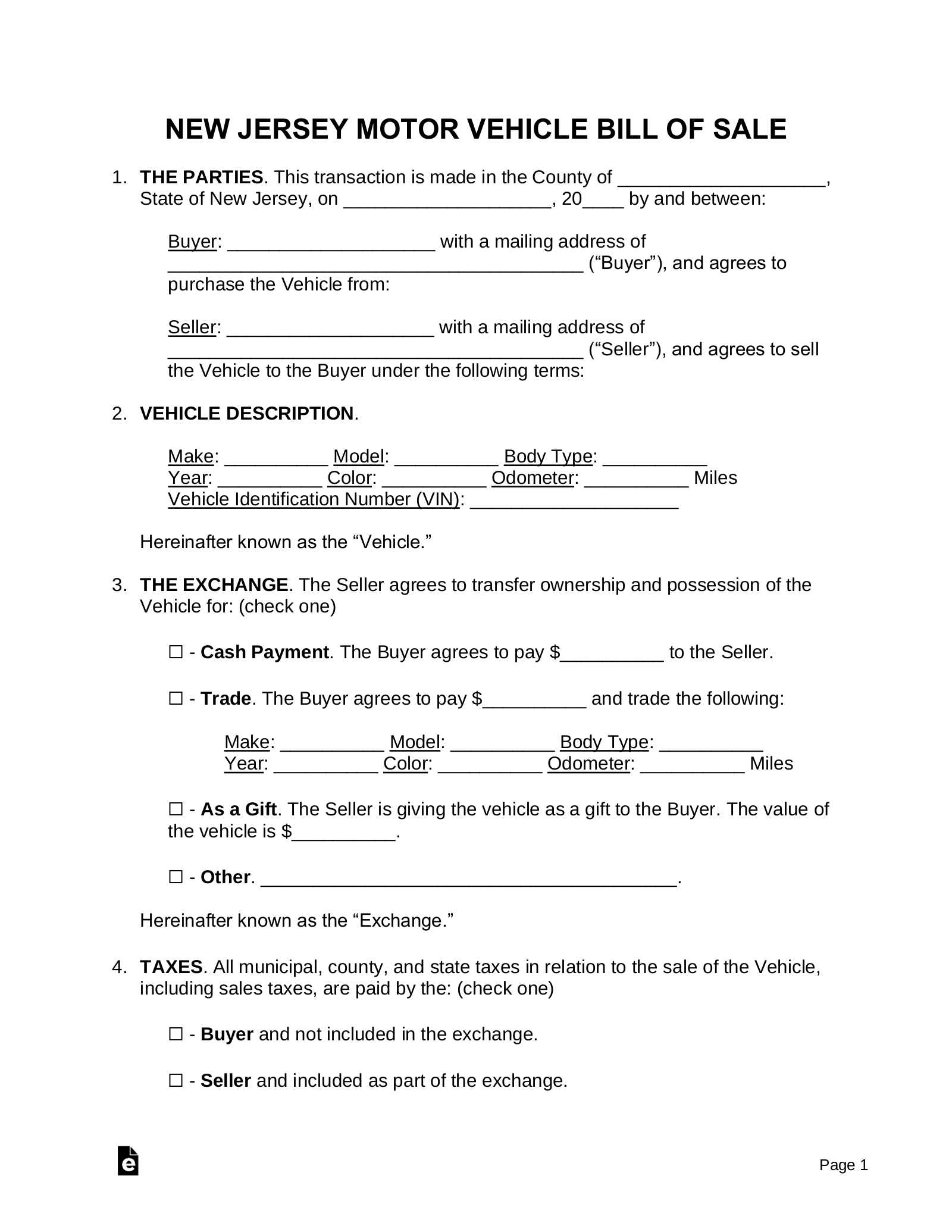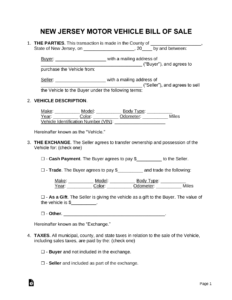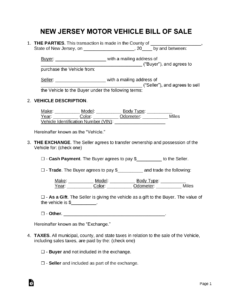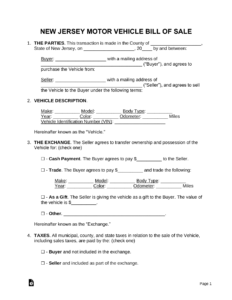Navigating the process of buying or selling a vehicle in New Jersey can feel like a maze, with various forms and regulations to consider. One document that often comes up, and for good reason, is the bill of sale. While it might seem like a simple receipt, its importance extends far beyond just acknowledging a transaction. It’s a critical piece of paperwork that protects both the buyer and the seller, ensuring a smooth and legally sound transfer of ownership.
Whether you’re selling your beloved car or purchasing a new-to-you ride, having a properly filled-out bill of sale is key to avoiding future headaches. It acts as a clear record of the agreement made between the parties involved, preventing misunderstandings and providing proof of transaction details. So, let’s dive into why this document is so essential and how you can make sure you’re using it effectively for your New Jersey vehicle transaction.
Why You Absolutely Need a Bill of Sale in New Jersey
When you’re dealing with a vehicle transaction, a bill of sale isn’t just a formality; it’s a foundational legal document. Think of it as a comprehensive receipt that details every aspect of the sale. Its primary function is to serve as proof that a transfer of ownership has occurred, and it lays out the specific terms under which that transfer took place. This is crucial for both parties involved, offering distinct advantages and protections.

For the seller, a bill of sale is your official record that you no longer own the vehicle. This is incredibly important because it releases you from any future liability associated with the car, such as accidents, parking tickets, or toll violations that occur after the sale date. Without this documented proof, you could potentially be held responsible for events tied to a vehicle you no longer possess. It’s peace of mind, essentially, knowing you’ve officially handed over the reins.
On the flip side, for the buyer, this document is your initial proof of ownership. While the title is the ultimate proof, the bill of sale validates your claim to the vehicle until the title is officially transferred and registered in your name with the New Jersey Motor Vehicle Commission (MVC). It confirms the purchase price, the date of sale, and the specific details of the vehicle, which are all vital pieces of information you’ll need for registration and title application. It ensures you received exactly what you paid for, as described by the seller.
While the New Jersey MVC does not always require a bill of sale for vehicle registration, it is highly recommended by legal experts and even the MVC itself. It provides an undeniable paper trail for the transaction, which can be invaluable in case of any future disputes or issues. Having all the agreed-upon terms written down and signed by both parties safeguards everyone involved.
Essential Details for Your Bill of Sale
- Seller’s Full Legal Name and Address: This identifies who is selling the vehicle.
- Buyer’s Full Legal Name and Address: This identifies who is purchasing the vehicle.
- Vehicle Identification Number (VIN): This unique 17-character code identifies the specific vehicle.
- Make, Model, Year, and Odometer Reading: These details provide a clear description of the vehicle at the time of sale.
- Sale Price: The exact agreed-upon amount the vehicle is being sold for.
- Date of Sale: The precise day the transaction occurred.
- Signatures of Both Seller and Buyer: These are crucial for the document’s legal validity.
- “As-Is” Clause (if applicable): A statement indicating the vehicle is sold without warranties, in its current condition.
Where to Find and How to Use Your Nj Motor Vehicle Bill of Sale Template
Finding a reliable nj motor vehicle bill of sale template is easier than you might think, and there are several trustworthy sources. You can often find generic templates online through various legal document websites or even directly from the New Jersey Motor Vehicle Commission’s official website or related state resources. It’s always a good idea to ensure the template you choose is designed with New Jersey’s specific requirements or common practices in mind, even though a basic bill of sale format is largely universal. Look for one that includes all the crucial fields we discussed earlier, ensuring nothing important is left out.
Once you have your template, filling it out accurately is the next crucial step. Start by gathering all the necessary information for both the seller and the buyer, including full legal names, current addresses, and contact details. Then, meticulously record all the vehicle specifics: the make, model, year, and especially the Vehicle Identification Number (VIN). The VIN is paramount as it uniquely identifies the car being sold and must be exact. Don’t forget to write down the current odometer reading at the time of sale – this is a legal requirement in many places and crucial for title transfer.
Next, clearly state the agreed-upon sale price in both numerical and written form to avoid any ambiguity. It’s also wise to specify the method of payment. Make sure the date of the sale is correctly entered. If the vehicle is being sold “as-is” – meaning without any warranties and the buyer accepts it in its current condition – it’s a good practice to include an “as-is” clause directly in the bill of sale. This protects the seller from claims about vehicle defects discovered after the sale.
Finally, and perhaps most importantly, both the buyer and the seller must sign the bill of sale. Their signatures confirm their agreement to the terms outlined in the document. It’s highly recommended that each party receives an original signed copy of the bill of sale for their records. While notarization isn’t always legally required for a bill of sale in New Jersey, having it notarized can add an extra layer of legal authenticity and prevent disputes over signatures later on, especially for higher-value transactions.
- Gather all identifying information for both parties and the vehicle beforehand.
- Fill in every field clearly and legibly, double-checking for accuracy.
- Ensure both buyer and seller physically sign all copies of the document.
- Provide each party with an original signed copy for their personal records.
- Consider notarization for added legal security, especially for private sales.
A properly executed bill of sale serves as the bedrock of your vehicle transaction, providing clarity and legal protection. Taking the time to accurately complete this document can prevent a multitude of potential headaches down the road for both the buyer and the seller. It’s a small effort that yields significant peace of mind.
Remember, a thorough and well-documented sale is a smooth sale. This crucial piece of paper streamlines the title transfer process, helps with accurate registration, and offers a clear, undeniable record of who owns what and when. By prioritizing the creation of a comprehensive bill of sale, you’re setting yourself up for a hassle-free and legally sound vehicle transfer experience.



